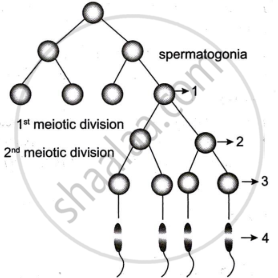Advertisements
Advertisements
Question
Give a schematic representation of spermatogenesis and oogenesis in humans.
Solution
 Gametogenesis
Gametogenesis
RELATED QUESTIONS
Define spermiation.
Identify True/False statement. Correct false statement to make it true.
Oogenesis takes place in corpus luteum.
Multiple choice question.
The given figure shows human sperm. Various parts of it are labelled as A, B, C, and D. Which labelled part represents acrosome?

If newborns are produced at the age of menopause, they may be with some abnormalities. Why?
Complete the analogy.
1 primary spermatocyte : 4 spermatozoa :: 1 primary oocyte : ____________.
Calculate the number of sperms and ova produced from 40 primary spermatocytes and 40 primary oocytes.
Acrosome reaction in sperm is triggered by ______.
Sertoli cells are found in ______.
By which process sperms released from the seminiferous tubules?
There is no cell division involved in ______.
Connective tissue around seminiferous tubules possess endocrine cells called ______.
Select the correct sequence of stages of spermatogenesis in a human male ______.
Read the following and answer from given below:
Oogenesis is the process of the formation of an ovum in the ovaries. It consists of three phases: multiplication, growth, and maturation. Oogenesis is controlled by hormones GnRH, LH, FSH. GnRH secreted by the hypothalamus stimulates the anterior lobe of the pituitary gland to secrete LH and FSH.
Which cell division is involved in the formation of secondary oocytes?
Aquatic animals in which fertilisation occurs in water are said to be
Sperms can be stored for several years in liquid nitrogen with a temperature of ______.
The spermatogonia undergo division to produce sperms by the process of spermatogenesis. Choose the correct one with reference to above.
Name the germinal layers from which the following organs develop: Tongue, heart, sweat glands, vagina, mammary glands, kidney.
The diagram given below shows the various steps in spermatogenesis.

- Name the parts labelled '1', '2' and '3'.
- Name the process by which part '3' changes to part '4'.
Draw a labelled diagram of a section through ovary.
